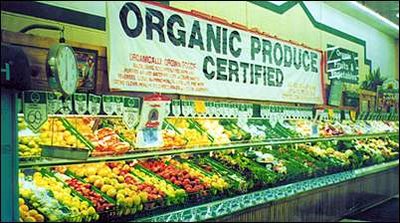 UNITED KINGDOM - Sales of organic produce in the UK have jumped 30% in a year and are now worth £1.6bn annually.
UNITED KINGDOM - Sales of organic produce in the UK have jumped 30% in a year and are now worth £1.6bn annually.All the leading supermarkets have expanded their range of organic food rapidly in the last year and report dramatic growth in demand. Supermarkets accounted for £1.2bn of the total market for organic produce in 2005.
Sainsbury's and Waitrose were earliest to exploit demand but growth is now also strong in supermarkets with less affluent customers. Sainsbury's, Tesco and Waitrose all say they have seen growth in organic sales of around 20% year on year.
Tesco said that its organic fruit and vegetable sales were growing by 70%. One in three of its shoppers now buy some organic produce, according to a spokeswoman. Asda said it was aiming to sell 1,000 organic lines by Christmas, doubling the size of its range as it tries to catch up with the market leaders.
Half of shoppers in the most disadvantaged socio-economic groups now buy some organic produce, according to the Soil Association's annual assessment.
But as organic fortnight begins today, the success story comes with a warning. The organic farmers organisation, the Soil Association, says that supermarkets rushing to increase their share of the sector are making it harder for pioneeers of the movement to survive. Patrick Holden, director of the Soil Association, said: "A significant number of small organic businesses have suffered from supermarkets switching suppliers or abandoning a brand in favour of their own label production. There is a tyranny about own label products that allows supermarkets to abuse small producers. Customers need to insist on branded products."
Mr Holden said he knew of at least two suppliers who had been threatened with their products being delisted by a supermarket if they refused to switch their production to the supermarkets' own label.
The Guardian has spoken to several organic companies who confirm that they have been under pressure from major retailers but fear losing their business altogether if they are identified. The problems they report range from supermarkets selling their own label organic food at an unrealistic subsidised price to capture market share, to branded recipes being copied for own label lines and prices paid to producers being driven down below the cost of production.
Leading retailers deny that they are squeezing brand names out of the market. Asda, which says its organic sector has grown 30% year on year, said the increase had mostly been driven by branded products, since it was quicker to build on them than create new own label products. Tesco and Sainsbury's also said they worked closely with organic suppliers.
Both Tesco and Sainsbury's have recently announced that they will be running pilot schemes to deliver boxes of fruit and vegetables to individual houses. "In the lasts three years, we've seen a mindset change in people's attitudes towards food," said Alison Austin, head of sustainability at Sainsbury's.
The problem now was meeting demand. Organic meat was in short supply, and a shortage of forage meant supplies of British organic milk were unlikely to be sufficient come winter, she added.
from The Guardian Unlimited
No comments:
Post a Comment